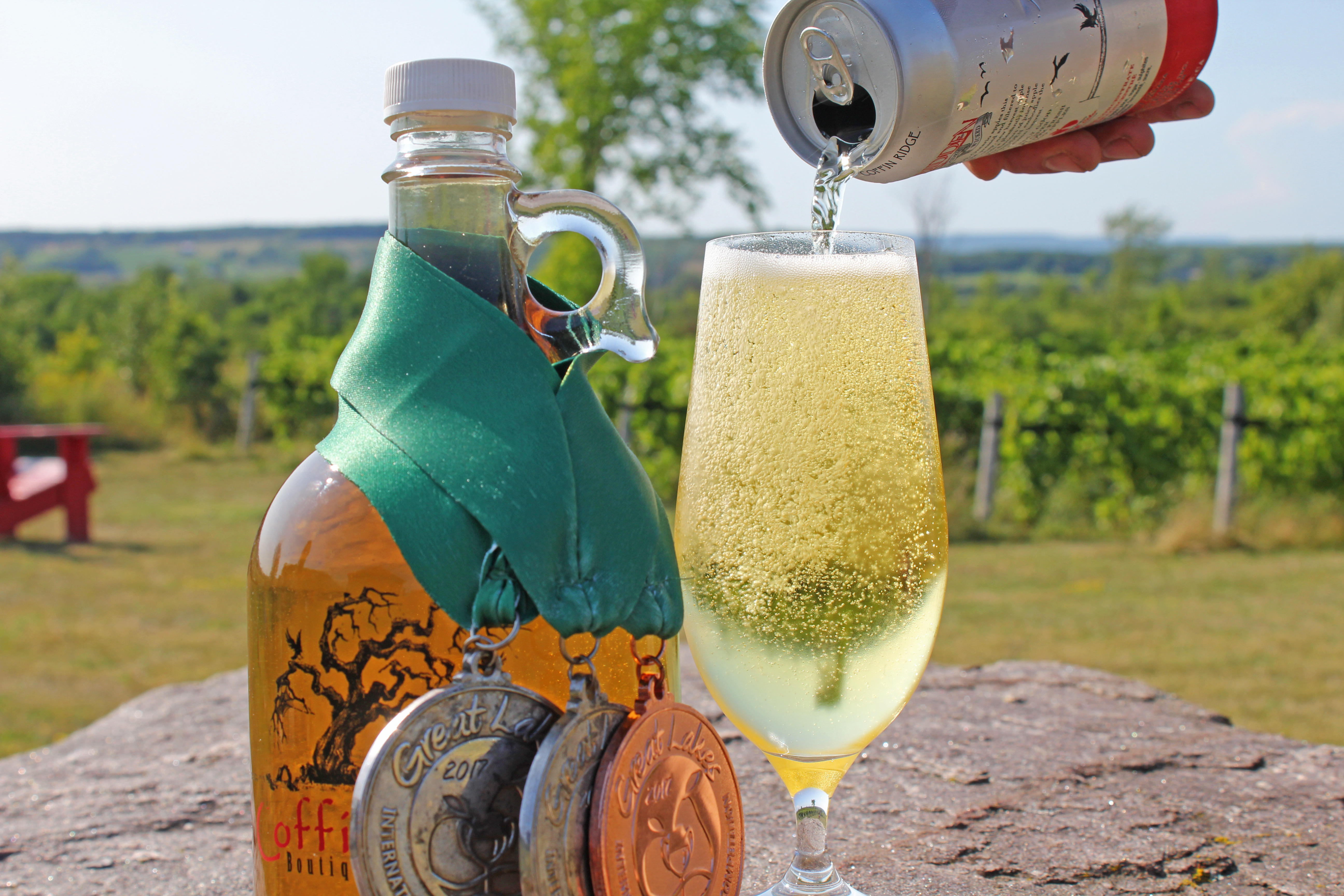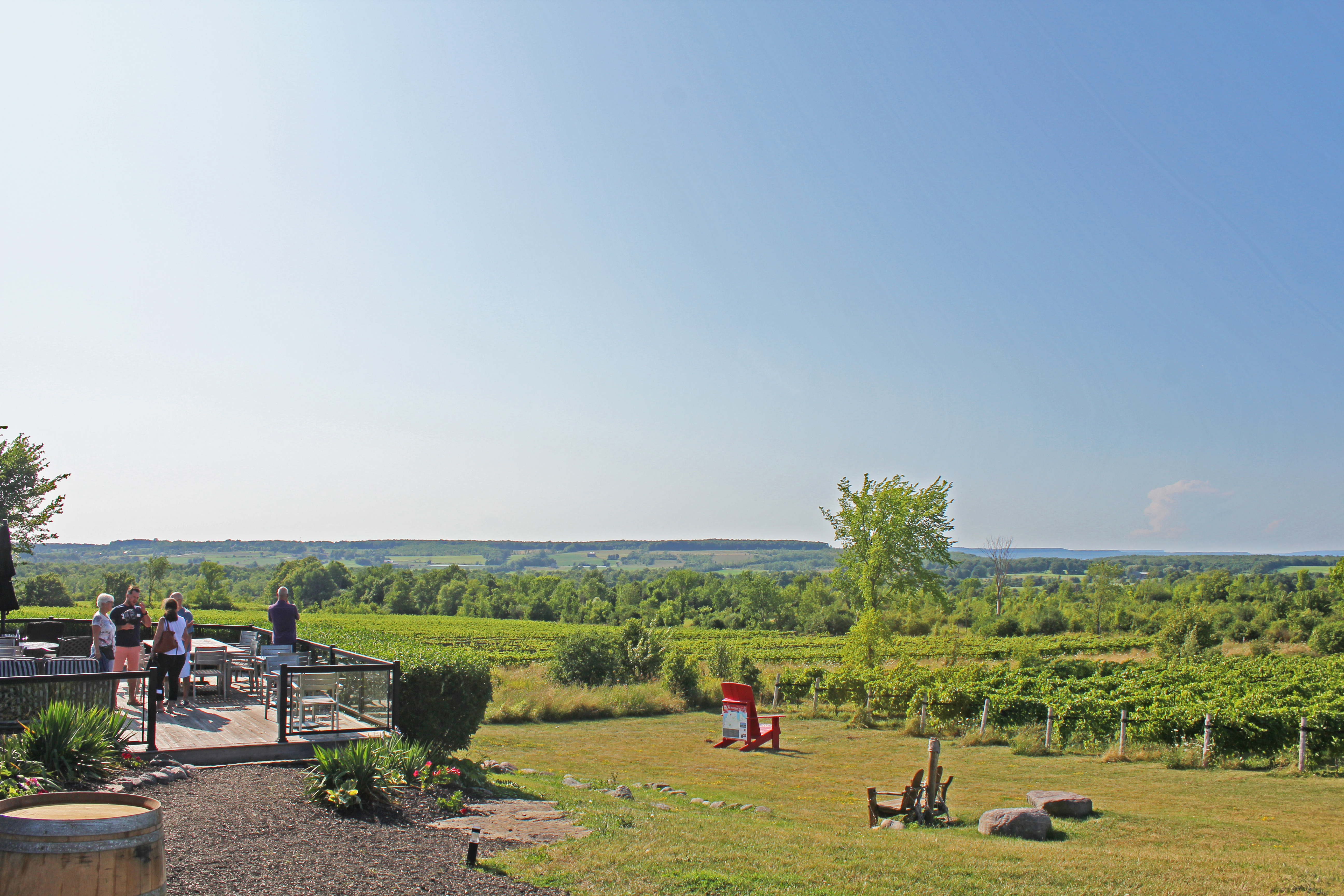Winning a
certain award from the prestigious GLINTCAP international cider awards in Michigan must have lit a fire under Coffin Ridge cidermaker Joel Loughead and inspired him to keep on churning out new offerings. His Maple & Rosemary cider took home the Great Lakes International Cider and Perry Competition’s
Best-In-Class award back in May – effectively making a Grey County cider the world’s #1 specialty product in its class.
That’s a big deal.
With the Maple & Rosemary all but gone – he took to the recesses of his cidery to brew up a couple new ciders to whet people’s whistles. Cue two new Coffin Ridge ciders that we can’t get enough of… because they’ll inevitably sell out.
I’m sitting near the window in the Coffin Ridge tasting room while Joel serves a thirsty party of 4. Not only does he make the cider, but he can be caught pouring glasses as well. He comes over with two stunning glasses of this gorgeous, liquified ruby-red precious stone colour. It’s glistening in the afternoon sunlight pouring in from the southwest facing vineyard in Silcote west of Meaford.

“This is field-berry and mint,” says Joel. “Small batch. Always using local apples and fruit – as much as possible. It’s predominantly apples, by volume like 90%"
It’s luscious. Fresh. Kick you in the jowls good – and it protects a lovely zest of local mint both on the nose, and post-sip. It’s fruity, thanks to a combination of blackberries, raspberries, strawberries, and blueberries, and rested on peppermint as well.
“I like that minty finish,” he smiles. “It’s certainly anything but bitter… Wanna go outside?”
On the way to the back patio, Joel explains his inspiration for this offering. It isn’t his first foray into a berry cider – he tackled another brew a couple years back that featured all local strawberries and wild mint foraged exclusively from the Coffin Ridge property, but that’s a bit of a classic flavour profile. This iteration is interesting and complex in an entirely new way.
Only weighing in at a total quantity of 650 litres, it’s a true representation of
small batch. It’ll never be available at the LCBO. What gives it the freshness and flavour it has, is a dedication to exploration and the ability to keep a close, hawk-like eye on the entire fermentation process.
“It sounds like, ‘oh we’ll just scale it up;’ Ok, have you ever tried to do that with a batch of soup and just made 10 times as much? Doesn’t work that way. It’s always harder to do, you’re always going to lose some quality.”
I had the luxury to be dropping off Apple Pie Trail brochures a few days prior to this interview, and Joel had just pulled the first wee dram from the tanks. It was unfiltered and raw – an aesthetic and profile he’d love to continue experimenting with, but with cider – it’s also not possible. As much magic as cidermakers may
appear to possess, they
are limited by biological and natural law.
“It makes it way less stable... I do leave some ciders not sterile-filtered – but [for the most part all Coffin Ridge ciders are sterile filtered]. Sterile filtration means you’re taking all the micro-organisms right out of it - like yeast and bacteria. It goes through a filtration process that’s so fine that everything like that gets left behind – and they’re what’s going to make it stable. I could leave it all in and add a bunch of chemicals to make it chemically stable, but I don’t want to do that. I could leave it unfiltered and roll the dice and hope it doesn’t go off before it’s sold out – but I always want to make sure the product I’m handing over is great… While I look the unfiltered look with it being hazy and that, I also like this polished look. It looks like a polished gem when you filter that cider.”

Is it good? I can wax poetic all day, but the numbers speak for themselves. It was day two of availability, and one keg was already gone by Wednesday at 4:30pm.
Joel had another uber unique cider – and it’s too interesting to not write about. Brewed in another very small batch of 450 liters, Coffin Ridge Spruce Gose-style cider (pronounced Go-sah.) was on tap until it recently sold out. Originally a traditional German-style of beer that comes from the town of Gose – where the salty, brackish municipal water makes the product spiced and sour, Joel’s play on this style of beer was a big hit.

“There’s really no such thing as an
apple Gose, but playing on the Gose beer style, the Spruce Gose was all of those things: coriander, citrus, salt, and rested on a bed of wild foraged Spruce tips from the Bruce Peninsula. I really liked this really resinous, bittered quality, that was completely unique. Both on the nose and at the ending coming from the salt and the natural acids in the cider.”
This tenacious dedication to experimentation and innovation is likely what won Joel that award. When an artisan takes a chance on something new and commits their time to perfecting a potential unknown, good things usually happen. Consider it a nod of respect from the universe – good things come to those who experiment. Cider drinkers here in Grey County and South Georgian Bay apple country are lucky.